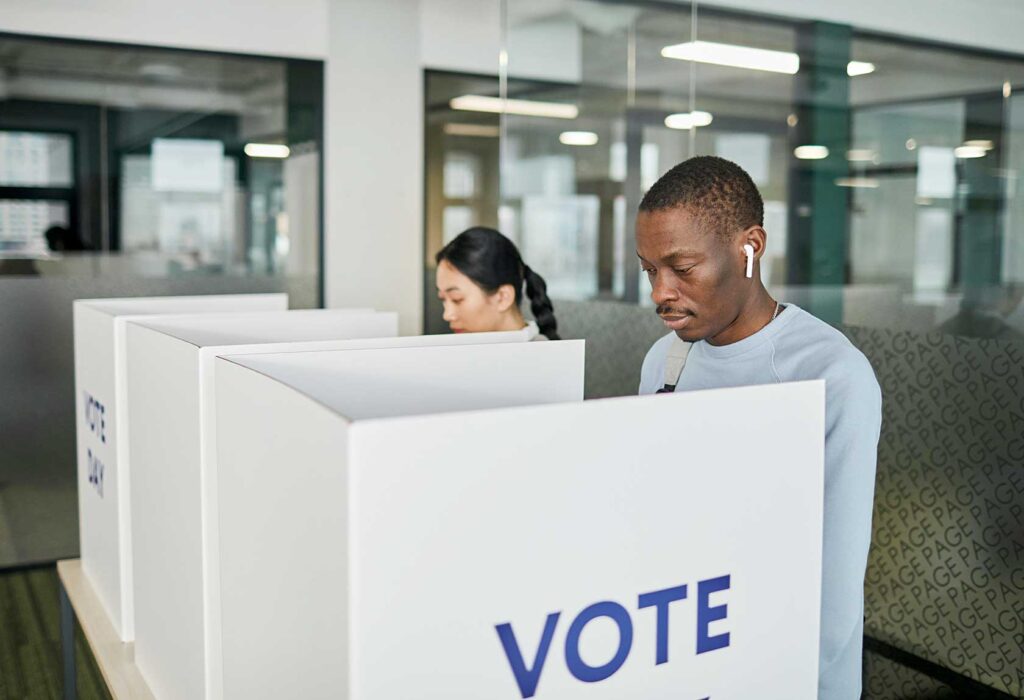
When it comes to issues like immigration during the presidential election cycle, political parties are placing a major focus on immigrant voters, particularly those who could sway outcomes in key battleground states.
One group that often flies under the radar in these discussions is Black immigrants. This rapidly growing demographic is reshaping the Black electorate with its diverse social, cultural and political views.
According to the New American Economy, the Black immigrant population grew by 30% between 2010 and 2018, and the 2020 U.S. Census allowed Black Americans to list their national origins for the first time. As a result, individuals like Ghanaian Americans in Texas could mark “Ghana” to highlight their heritage. With this recognition comes visibility: 4.3 million Black immigrants now reside in the U.S., and 2.5 million of them are eligible to vote.
In Texas, Black immigrants have nearly doubled, from 172,000 in 2012 to 309,900 in 2022, making them a critical part of the electorate. To better understand the significance of this growing voting bloc, the Defender spoke with local Black immigrants who shared their personal journeys, their views on politics, and why voting is essential for them.
Gil Ingles is an IT infrastructure engineer and award-winning media personality who immigrated to the U.S. from Angola at 15.
“I came from Angola, a country still at war, where opportunities were scarce. It wasn’t something we had planned. The school year had already started, and I had to go through the process of changing my status to a student. So, adapting to American culture and independence was a challenge.”
Ingles’ experience as an immigrant also shaped his political identity. “I came during the Reagan administration, and I started to understand politics during the Iran-Contra hearings,” he explains. “I noticed early on that there were two Americas — Black America and White America — each navigating politics differently. For Black America, churches, fraternities, and community centers played a huge role in election times.”
This awareness of the two contrasting Americas helped Ingles form his own views on the importance of voting and civic engagement. “Voting means freedom and the right to choose. It’s really the soul of America,” he says. “It’s about listening to the candidate and deciding based on their platform and how it will impact my community.”
Over time, Ingles has become a voice for the African diaspora through his radio show, helping bridge the gap between African immigrants and their American-born counterparts. The platform fosters discussions around identity, culture and politics, highlighting how varied Black immigrants’ views are.
“Black immigrants are much more diverse than people think,” Ingles explained. “We come from Africa, the Caribbean, South America [and] Europe. Naturally, that diversity extends to our political and social perspectives.”
For Bernada Garcia Nuñez, her decision to leave her home country was driven by the pursuit of better opportunities. “It wasn’t an easy decision,” she shared. “I left everything behind in Honduras — my family, friends — but I had to do it for my future.”
Arriving in Houston, Nuñez found comfort in the city’s large and diverse immigrant population, which helped her transition to life in the U.S. “I was surprised by how many Black immigrants lived in Texas,” she said. “In some ways, it felt like home, but there were still many barriers to overcome.”
One of the most significant hurdles for Nuñez was navigating the complexities of U.S. politics. “Politics in Honduras was very different. Here, I had to learn how the system worked, how to register to vote, and what my rights were,” she said. Over time, she became more engaged, especially with community issues.
Nuñez identifies as a Democrat and is particularly passionate about immigration reform and access to health care. “I vote because I want to make sure immigrants like me have a voice,” she explained. “Policies either help or harm immigrant communities, and I want to ensure that people like me are protected.”
Facing Challenges
Nuñez spoke about Black immigrants’ unique challenges, particularly their sense of invisibility in national political discussions. She feels like local officials should find better comments other than Hispanics stealing jobs or that they’re criminals.
“We’re often overlooked because we don’t fit into the usual categories,” she said. “But we’re here, and we’re growing in numbers.”
The 2024 election presents an opportunity for Black immigrants to make their voices heard. However, the community’s diversity makes it difficult for political parties to craft one-size-fits-all messaging. “Some of us are more progressive, some conservative,” Ingles pointed out. “At the end of the day, we all want to be recognized.”
Nuñez leans progressive. She hopes Vice President Kamala Harris wins this year not just because she is a woman or person of color but also because she is someone who “is smart enough and doesn’t only think about the money.”
“My first vote was in March 1977. I’ve been living here for more than 30 years and having a household where two incomes don’t feel like it’s enough. [It’s] hard. I didn’t get an education because I was the oldest of eight children supporting my family,” she said. “With my vote, I hope that it makes some type of difference, especially for immigrants who can’t vote.”
Laura Onyeneho is a reporter for Defender Network






